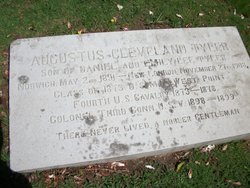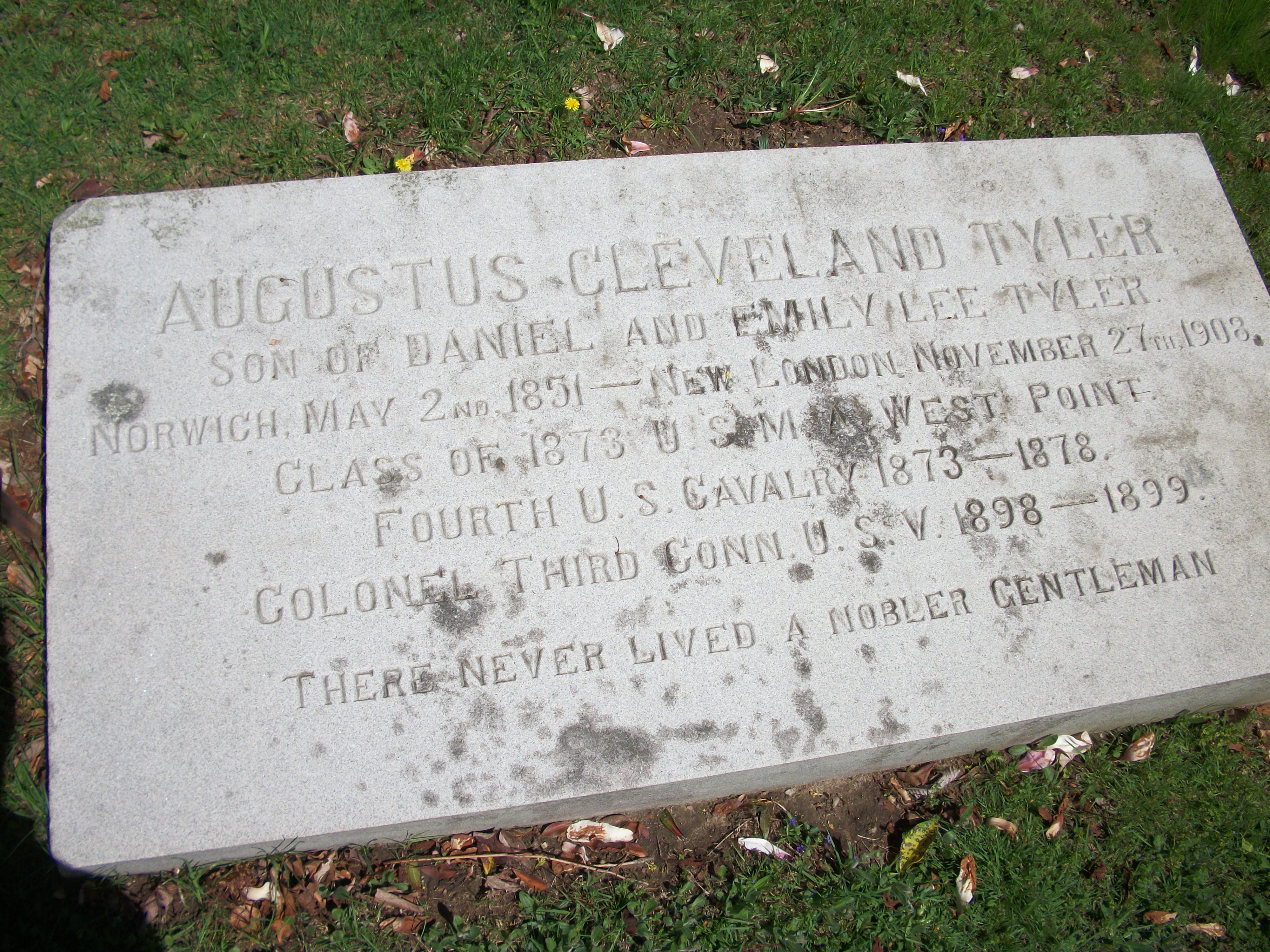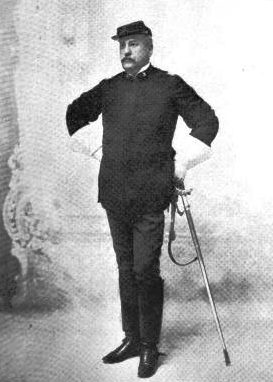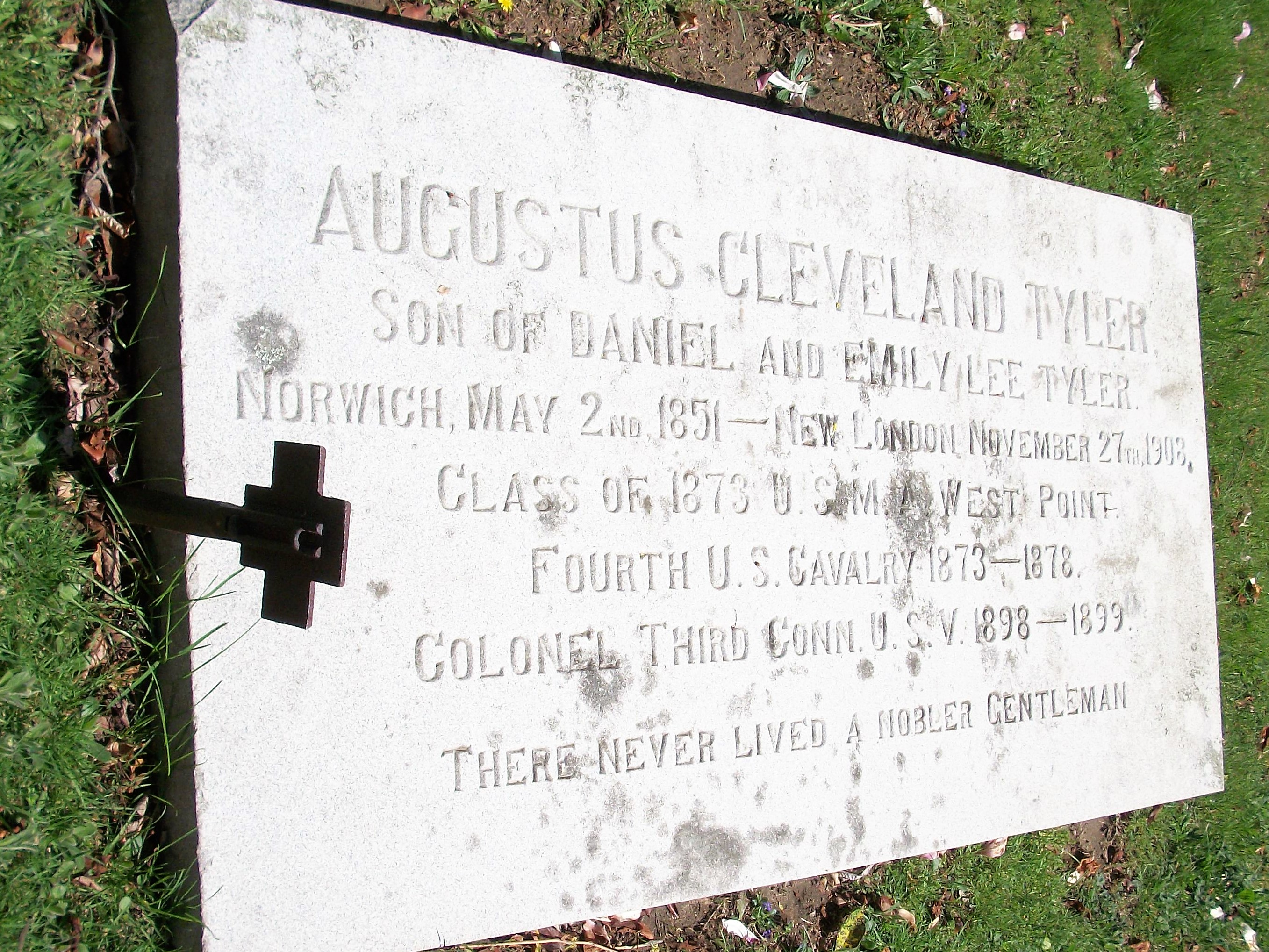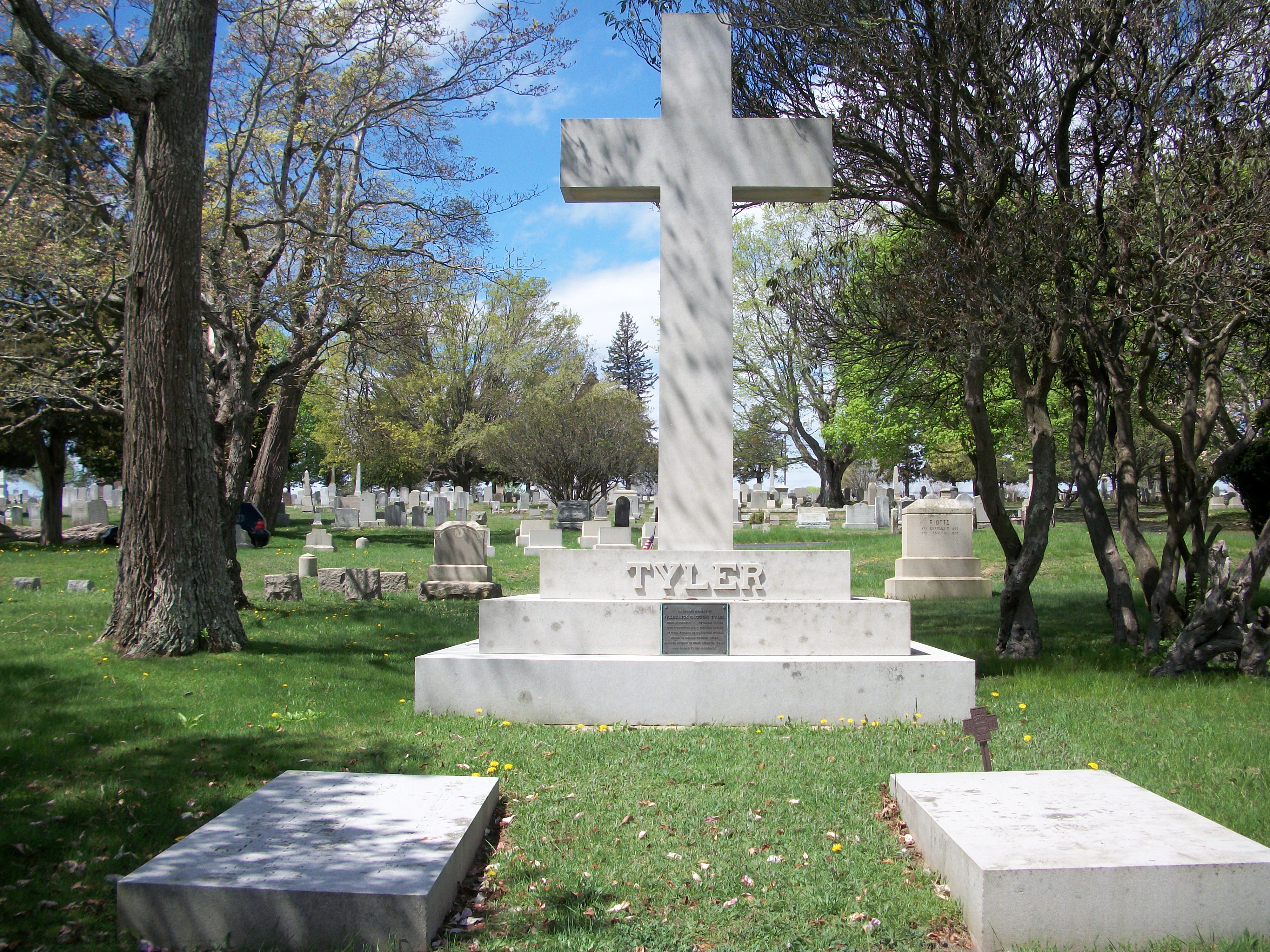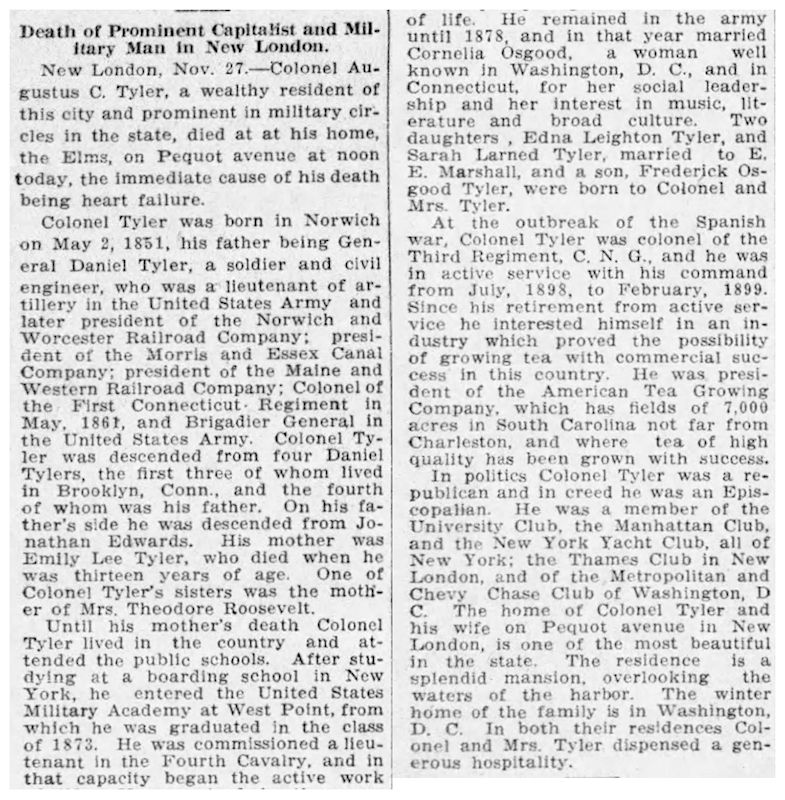He was the son of Daniel Tyler, USMA Class of 1819 and Emily Lee Tyler.
On January 3, 1878, he married Cornelia Osgood, daughter of Dr. Charles Osgood, of Norwich, Connecticut.
They were the parents of three children.
The Evening Star
Saturday, November 28, 1908
Death Of Col. Tyler
Cousin to Mrs. Roosevelt Dies at New London, Conn.
Word has been received here of the death of Colonel Augustus Cleveland Tyler, which occurred yesterday at New London, Connecticut. He was a cousin to Mrs. Roosevelt and was born in New London nearly fifty-seven years ago. During the war with Spain Colonel Tyler established his home in this city. He was a member of the Army and navy Club, the Chevy Chase Club and the Metropolitan Club. Colonel Tyler graduated from West Point in 1873 and held a commission in the regular army for five years. He commanded the Third Connecticut Volunteer Infantry in the Spanish American War.
Several years ago Colonel Tyler built the stately residence, 1634 I Street, which is now occupied by the Russian ambassador. While in the south he became interested in the growing of American tea and purchased a large plantation near Charleston, South Carolina and met with much success growing tea.
His wife, a son, F.O. Tyler and two daughters, Miss Edna [Leighton] Tyler and Mrs. E. [Edward] E. [Everett] [Sarah Larned Tyler] Marshall, survive him. The interment will probably be at Norwich, Connecticut.
Fortieth Annual Reunion Of The Association of the Graduates Of The United States Military Academy, At West Point, New York, June 10th, 1909, Saginaw, Michigan, Seeman & Peters, 1909.
Augustus Cleveland Tyler
No. 2498. Class of 1873.
Died November 27th, 1908, in New London, Connecticut, aged 58.
The subject of this article was born May 2, 1851, in Norwich, Connecticut. He was a son of General Daniel Tyler 4th, class of 1819, United States Military Academy and Emily Lee, daughter of Benjamin and Elizabeth Leighton Lee, of Cambridge, Massachusetts. General Daniel Tyler at the time of his death, November 30th, 1882, was the oldest living graduate of West Point. He resigned from the Army in 1834. In 1861, when sixty-two years of age, he was the first man in Connecticut to volunteer for service in the Civil War and went to the front as Colonel of the First Regiment Connecticut Volunteer Infantry. Later he was commissioned Brigadier General. General Tyler's father, Daniel Tyler 3rd, was adjutant of Putnam's regiment at the battle of Bunker Hill. His mother, Sarah Edwards, was a daughter of Timothy and the oldest grandchild of Jonathan Edwards.
Until thirteen years of age, Augustus Cleveland Tyler's boyhood was passed in Norwich. After that period, until his entrance at West Point, he was a student at the Charlier Institute in New York. His summers were spent in Red Bank, New Jersey, where General Tyler purchased a country home soon after the death of his wife in 1864.
On January 3rd, 1878, Augustus Tyler was married to Cornelia Osgood, daughter of Dr. Charles Osgood, of Norwich, Connecticut. Of this union there were born Edna Leighton Tyler, Sarah Larned Tyler (Mrs. Edward Everett Marshall), Frederick Osgood Tyler.
In 1898, when in command of the Third Connecticut United States Volunteer Infantry, then stationed at Camp Marion, Summerville, South Carolina, Colonel Tyler became impressed by the commercial possibilities of the planting and manufacturing of tea in the southern states. Subsequently he bought nearly seven thousand acres of land comprising the four plantations Holly Grove, Rutledge Island, Mowbray and Turkey Hill in Colleton County, South Carolina, where very flourishing tea gardens and a factory for the manufacture of tea are now located and under the management of Frederick Osgood Tyler. Colonel Tyler was largely interested in The Anniston (Alabama) Manufacturing Co., of which corporation he was a director. He was also a director of The Union National Bank of New London.
Although seldom, if ever, absenting himself from his family circle in the evening, no man found greater enjoyment in the companionship of men. It was his custom to pass a part of each afternoon at one of the following clubs of which he was a valued member: University, Manhattan and New York Yacht Clubs of New York; Metropolitan, Chevy Chase and Patuxent Hunt Clubs, of Washington, D.C.; Charleston Club and Charleston Country Club, of Charleston, South Carolina; Thames Club and Pequot Casino Association, of New London, Connecticut. He was president of the latter at the time of his death.
Recollections Of The Military Life Of Augustus Cleveland Tyler, Class Of 1873, United States Military Academy
We first met as Seps on reporting at West Point on August 28, 1869. He was then a dark haired, dark eyed, ruddy complexioned youth of medium stature, 18 years old. His cadet career was the usual uneventful one and at this distance of time I can recall no special incident worthy of mention except perhaps that he stood first in French and Spanish without having to work very hard to do so and was very far from being equally distinguished in drawing. He had a genial nature and was fond of companionship. He never growled, sulked or complained, but faced the vexatious and disagreeable incidents of cadet life with sometimes a grim, half-humorous remark, indicating his resignation to the inevitable and with at other times an epigrammatic comment or quotation that was both apt and witty. He had a particular faculty, that showed his good heart and that became more apparent to me in our service together after graduation, for discerning what was commendable in the character and disposition of others and for appreciating their mental strength and capabilities whether developed with or without a school education. Very unselfish and very generous, always modest, thoughtful of others and courteous, he was a true gentleman and most loveable man.
On graduation, he and I were the only members of the class assigned to the Fourth Cavalry, in which regiment we were both destined to be thrown much together for the next five years and to know each other better. He joined at Fort Clark, Texas, at the end of September 1873, while I followed at the end of November. On arriving at San Antonio by stage on the way to join, I found he was already known by reputation at the Headquarters of the Department of Texas. I was told that he was living in camp, had already been on a scout after Indians, liked the life and, better still, that the officers of the regiment liked him.
Article continues with details regarding events in Texas.
Our next station together was at Fort Sill where we met in May 1875. Shortly afterward he went home on leave and on his return, he went to Fort Elliott, then only a cantonment just established in the Texas Panhandle. We came together in the field again in August 1876, at Camp Robinson, Nebraska, where six troops Fourth Cavalry were sent after the Custer Massacre, with the prospect of having some severe fighting. His troop was not selected to be taken away from Indian Territory, but from the numerous volunteers belonging to the troops that had to stay there he was one of those that General Mackenzie, the Colonel of the regiment, took with him. The events that took place on General Crook's Powder River Expedition in the winter of 1876-1877, have been described in both newspapers and magazines. Among the latter is one by the late Captain John G. Bourke, Third Cavalry, entitled Mackenzie's Last Fight With the Cheyennes, that is widely known.
Article continues with details of the events.
At the close of the expedition Tyler had to take a sick leave due to his eyes having been affected. by the bright reflection from the snow. He rejoined in April and shortly afterward, many hundreds of Indians having surrendered, the six troops of the Fourth Cavalry marched back to Indian Territory, Tyler's troop arriving at Fort Sill early in July. Nothing of interest occurred there.
In the meantime, part of the regiment had been sent to Texas on account of troubles on the Rio Grande border and Tyler returned from leave in February 1878, to his old station of Fort Clark. The country there was now becoming settled and cattle raising attempted. This was retarded by lawless Mexicans who stole large herds at a time, driving them across the Rio Grande. On the other hand, the Indian raids had practically ceased. Nevertheless, the new conditions kept the troops quite as much in the field as formerly and Tyler did his share of the work.
Finally, he resigned on July 1, 1878. He left the service regretted, loved and respected. So modest as he that it is likely that hundreds of those he met almost daily in his afterlife never knew or certainly never learned from him, that he had participated in some of the most stirring campaigns on our frontier, marching many thousands of miles, enduring the severest fatigue and privations and getting his share of Indian fighting at a period of frontier warfare when our troops were most active. Never was there a more gentle and loveable character.
J.H. Dorst,
Colonel, Third Cavalry.
He was the son of Daniel Tyler, USMA Class of 1819 and Emily Lee Tyler.
On January 3, 1878, he married Cornelia Osgood, daughter of Dr. Charles Osgood, of Norwich, Connecticut.
They were the parents of three children.
The Evening Star
Saturday, November 28, 1908
Death Of Col. Tyler
Cousin to Mrs. Roosevelt Dies at New London, Conn.
Word has been received here of the death of Colonel Augustus Cleveland Tyler, which occurred yesterday at New London, Connecticut. He was a cousin to Mrs. Roosevelt and was born in New London nearly fifty-seven years ago. During the war with Spain Colonel Tyler established his home in this city. He was a member of the Army and navy Club, the Chevy Chase Club and the Metropolitan Club. Colonel Tyler graduated from West Point in 1873 and held a commission in the regular army for five years. He commanded the Third Connecticut Volunteer Infantry in the Spanish American War.
Several years ago Colonel Tyler built the stately residence, 1634 I Street, which is now occupied by the Russian ambassador. While in the south he became interested in the growing of American tea and purchased a large plantation near Charleston, South Carolina and met with much success growing tea.
His wife, a son, F.O. Tyler and two daughters, Miss Edna [Leighton] Tyler and Mrs. E. [Edward] E. [Everett] [Sarah Larned Tyler] Marshall, survive him. The interment will probably be at Norwich, Connecticut.
Fortieth Annual Reunion Of The Association of the Graduates Of The United States Military Academy, At West Point, New York, June 10th, 1909, Saginaw, Michigan, Seeman & Peters, 1909.
Augustus Cleveland Tyler
No. 2498. Class of 1873.
Died November 27th, 1908, in New London, Connecticut, aged 58.
The subject of this article was born May 2, 1851, in Norwich, Connecticut. He was a son of General Daniel Tyler 4th, class of 1819, United States Military Academy and Emily Lee, daughter of Benjamin and Elizabeth Leighton Lee, of Cambridge, Massachusetts. General Daniel Tyler at the time of his death, November 30th, 1882, was the oldest living graduate of West Point. He resigned from the Army in 1834. In 1861, when sixty-two years of age, he was the first man in Connecticut to volunteer for service in the Civil War and went to the front as Colonel of the First Regiment Connecticut Volunteer Infantry. Later he was commissioned Brigadier General. General Tyler's father, Daniel Tyler 3rd, was adjutant of Putnam's regiment at the battle of Bunker Hill. His mother, Sarah Edwards, was a daughter of Timothy and the oldest grandchild of Jonathan Edwards.
Until thirteen years of age, Augustus Cleveland Tyler's boyhood was passed in Norwich. After that period, until his entrance at West Point, he was a student at the Charlier Institute in New York. His summers were spent in Red Bank, New Jersey, where General Tyler purchased a country home soon after the death of his wife in 1864.
On January 3rd, 1878, Augustus Tyler was married to Cornelia Osgood, daughter of Dr. Charles Osgood, of Norwich, Connecticut. Of this union there were born Edna Leighton Tyler, Sarah Larned Tyler (Mrs. Edward Everett Marshall), Frederick Osgood Tyler.
In 1898, when in command of the Third Connecticut United States Volunteer Infantry, then stationed at Camp Marion, Summerville, South Carolina, Colonel Tyler became impressed by the commercial possibilities of the planting and manufacturing of tea in the southern states. Subsequently he bought nearly seven thousand acres of land comprising the four plantations Holly Grove, Rutledge Island, Mowbray and Turkey Hill in Colleton County, South Carolina, where very flourishing tea gardens and a factory for the manufacture of tea are now located and under the management of Frederick Osgood Tyler. Colonel Tyler was largely interested in The Anniston (Alabama) Manufacturing Co., of which corporation he was a director. He was also a director of The Union National Bank of New London.
Although seldom, if ever, absenting himself from his family circle in the evening, no man found greater enjoyment in the companionship of men. It was his custom to pass a part of each afternoon at one of the following clubs of which he was a valued member: University, Manhattan and New York Yacht Clubs of New York; Metropolitan, Chevy Chase and Patuxent Hunt Clubs, of Washington, D.C.; Charleston Club and Charleston Country Club, of Charleston, South Carolina; Thames Club and Pequot Casino Association, of New London, Connecticut. He was president of the latter at the time of his death.
Recollections Of The Military Life Of Augustus Cleveland Tyler, Class Of 1873, United States Military Academy
We first met as Seps on reporting at West Point on August 28, 1869. He was then a dark haired, dark eyed, ruddy complexioned youth of medium stature, 18 years old. His cadet career was the usual uneventful one and at this distance of time I can recall no special incident worthy of mention except perhaps that he stood first in French and Spanish without having to work very hard to do so and was very far from being equally distinguished in drawing. He had a genial nature and was fond of companionship. He never growled, sulked or complained, but faced the vexatious and disagreeable incidents of cadet life with sometimes a grim, half-humorous remark, indicating his resignation to the inevitable and with at other times an epigrammatic comment or quotation that was both apt and witty. He had a particular faculty, that showed his good heart and that became more apparent to me in our service together after graduation, for discerning what was commendable in the character and disposition of others and for appreciating their mental strength and capabilities whether developed with or without a school education. Very unselfish and very generous, always modest, thoughtful of others and courteous, he was a true gentleman and most loveable man.
On graduation, he and I were the only members of the class assigned to the Fourth Cavalry, in which regiment we were both destined to be thrown much together for the next five years and to know each other better. He joined at Fort Clark, Texas, at the end of September 1873, while I followed at the end of November. On arriving at San Antonio by stage on the way to join, I found he was already known by reputation at the Headquarters of the Department of Texas. I was told that he was living in camp, had already been on a scout after Indians, liked the life and, better still, that the officers of the regiment liked him.
Article continues with details regarding events in Texas.
Our next station together was at Fort Sill where we met in May 1875. Shortly afterward he went home on leave and on his return, he went to Fort Elliott, then only a cantonment just established in the Texas Panhandle. We came together in the field again in August 1876, at Camp Robinson, Nebraska, where six troops Fourth Cavalry were sent after the Custer Massacre, with the prospect of having some severe fighting. His troop was not selected to be taken away from Indian Territory, but from the numerous volunteers belonging to the troops that had to stay there he was one of those that General Mackenzie, the Colonel of the regiment, took with him. The events that took place on General Crook's Powder River Expedition in the winter of 1876-1877, have been described in both newspapers and magazines. Among the latter is one by the late Captain John G. Bourke, Third Cavalry, entitled Mackenzie's Last Fight With the Cheyennes, that is widely known.
Article continues with details of the events.
At the close of the expedition Tyler had to take a sick leave due to his eyes having been affected. by the bright reflection from the snow. He rejoined in April and shortly afterward, many hundreds of Indians having surrendered, the six troops of the Fourth Cavalry marched back to Indian Territory, Tyler's troop arriving at Fort Sill early in July. Nothing of interest occurred there.
In the meantime, part of the regiment had been sent to Texas on account of troubles on the Rio Grande border and Tyler returned from leave in February 1878, to his old station of Fort Clark. The country there was now becoming settled and cattle raising attempted. This was retarded by lawless Mexicans who stole large herds at a time, driving them across the Rio Grande. On the other hand, the Indian raids had practically ceased. Nevertheless, the new conditions kept the troops quite as much in the field as formerly and Tyler did his share of the work.
Finally, he resigned on July 1, 1878. He left the service regretted, loved and respected. So modest as he that it is likely that hundreds of those he met almost daily in his afterlife never knew or certainly never learned from him, that he had participated in some of the most stirring campaigns on our frontier, marching many thousands of miles, enduring the severest fatigue and privations and getting his share of Indian fighting at a period of frontier warfare when our troops were most active. Never was there a more gentle and loveable character.
J.H. Dorst,
Colonel, Third Cavalry.
Family Members
Sponsored by Ancestry
Advertisement
Advertisement
